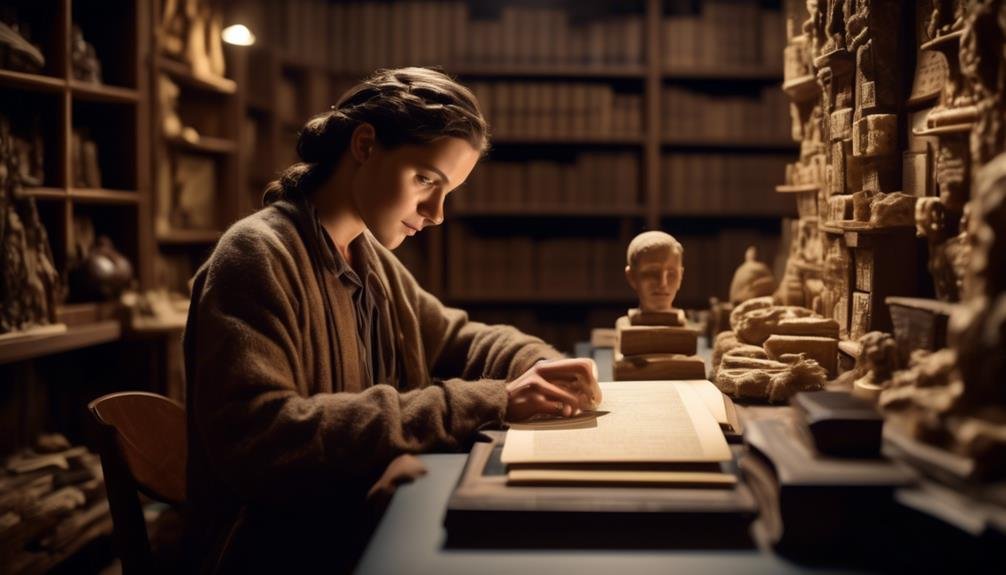Online Courses in Museum Studies: Preserving History
So, you're interested in the world of museum studies?
Well, have you ever considered the impact of preserving history and cultural heritage in today's digital age?
The field of museum studies offers a unique opportunity to not only explore the past, but also to shape the future.
With the rise of online courses, the accessibility and flexibility of learning about museum studies has never been greater.
But what exactly do these courses entail, and how can they prepare you for a career in this specialized field?
Key Takeaways
- Museum studies play a crucial role in preserving cultural and historical artifacts, maintaining a connection to our roots, and fostering a deeper understanding of our collective history and identity.
- The field of museum studies offers a wide range of career opportunities, including curator positions, education coordinators, conservation work, and specialized roles in collections management and exhibition design.
- Professionals in museum studies need a strong foundation in both traditional practices and modern digital technologies, as the industry demands skills in preservation techniques and museum management principles.
- Online learning in museum studies provides flexibility, interactive learning opportunities, and specialization options, allowing individuals to balance personal and professional commitments while gaining expertise in a specific area of museum studies.
The Importance of Museum Studies
Understanding the importance of museum studies is crucial for anyone looking to gain a comprehensive insight into the curation, preservation, and interpretation of cultural and historical artifacts.
Museum studies play a pivotal role in the preservation of our cultural heritage, ensuring that the stories and legacies of past civilizations aren't lost to time. By engaging with museum studies, individuals can appreciate the significance of cultural and historical preservation in maintaining a connection to our roots and understanding the evolution of societies.
The relevance of museum studies extends beyond mere conservation, encompassing the interpretation and presentation of artifacts to the public. This field allows for the exploration of diverse perspectives and narratives, fostering a deeper understanding of our collective history and identity.
Moreover, museum studies provide a platform for ongoing research and education, facilitating ongoing dialogue and discovery. By recognizing the importance of museum studies, individuals can contribute to the safeguarding and promotion of cultural and historical heritage for current and future generations.
Career Opportunities in Museum Studies
As you explore career opportunities in museum studies, it's important to consider the wide range of job prospects available in this field.
From curator positions to education coordinators, museum studies graduates have the chance to make an impact in various roles within cultural institutions.
Additionally, understanding the salary potential in these roles will provide valuable insight into the financial aspects of pursuing a career in museum studies.
Job Prospects
Museum Studies offers a wide range of career opportunities, including curatorial positions, educational roles, and conservation work, providing a diverse field for those interested in pursuing a career in the museum industry.
The job market for museum professionals is competitive, with a growing demand for individuals with specialized skills in areas such as collections management, exhibition design, and museum education.
Professional development is crucial in this field, as it allows individuals to stay updated with the latest trends and technologies in museum curation and management. With the increasing digitization of museum collections and the need for innovative visitor experiences, professionals in Museum Studies are expected to have a strong foundation in both traditional museum practices and modern digital technologies.
As such, individuals with a background in Museum Studies can explore various rewarding career paths in museums, galleries, historic sites, and cultural institutions.
Salary Potential
With the growing demand for specialized skills in areas such as collections management, exhibition design, and museum education, professionals in Museum Studies have the potential to secure rewarding career opportunities with competitive salaries in museums, galleries, historic sites, and cultural institutions. The employment outlook for museum professionals is promising, with the industry demand for skilled individuals expected to grow steadily. As museums continue to expand their collections and exhibitions, the need for qualified professionals in Museum Studies is on the rise. This expansion in the industry also contributes to the compensation potential and salary growth for individuals with expertise in this field. Below is a table illustrating the median annual salaries for various positions in Museum Studies, highlighting the potential for a financially rewarding career in this field.
| Position | Median Annual Salary ($) |
|---|---|
| Curator | 56,770 |
| Museum Educator | 49,660 |
| Exhibit Designer | 56,610 |
| Conservator | 48,400 |
| Archivist | 53,950 |
Key Skills and Knowledge Covered
As you explore online courses in museum studies, you'll gain in-depth knowledge of preservation techniques, including the latest methods and technologies used to conserve and protect valuable artifacts.
Additionally, you'll develop a deep understanding of museum management principles, learning how to effectively curate exhibitions, manage collections, and engage with diverse audiences.
These key skills and knowledge areas will equip you with the expertise needed to thrive in the dynamic and multifaceted field of museum studies.
Preservation Techniques
What are the essential preservation techniques that museum professionals must master to ensure the longevity and integrity of their collections? Preservation methods and restoration techniques are crucial for safeguarding the historical and cultural significance of artifacts. Museum professionals need to employ a variety of preservation techniques to prevent deterioration and ensure the longevity of the collections. This includes proper handling, storage, and environmental control to mitigate damage from light, temperature, and humidity. Additionally, conservation treatments such as cleaning, repairing, and stabilizing artifacts are essential for their preservation. Incorporating advanced technologies like digital documentation and 3D scanning further enhances preservation efforts. By mastering these preservation techniques, museum professionals can uphold the integrity of their collections for future generations.
| Preservation Techniques | Importance |
|---|---|
| Proper handling | Minimizes damage from physical contact |
| Environmental control | Prevents deterioration due to light, temperature, and humidity |
| Conservation treatments | Cleaning, repairing, and stabilizing artifacts |
| Advanced technologies | Digital documentation and 3D scanning for enhanced preservation efforts |
Museum Management Principles
To effectively manage museum collections, professionals must possess a comprehensive understanding of preservation techniques as well as key skills and knowledge in museum management principles.
Museum management involves a diverse set of responsibilities, including strategic planning, budgeting, and staff supervision.
Additionally, exhibition curation is a crucial aspect of museum management, requiring expertise in selecting and presenting artifacts to engage and educate visitors.
Effective management principles also encompass marketing strategies to attract diverse audiences, as well as legal and ethical considerations in acquisitions and loans.
Moreover, understanding the significance of cultural heritage and the role of museums in society is essential for successful museum management.
Advantages of Online Learning
Online learning offers a flexible and accessible approach to gaining knowledge and skills, particularly in the field of museum studies. This mode of learning provides numerous advantages, including flexible scheduling and interactive learning opportunities. With the ability to access course materials and lectures at any time, students can create a study schedule that fits their individual needs and commitments. In addition, online courses often incorporate various interactive elements such as virtual tours, discussion forums, and multimedia presentations, allowing students to engage with the course material in dynamic ways. These advantages are particularly beneficial for individuals who are working professionals or have other responsibilities, as they can pursue their education without having to compromise on their existing commitments.
| Advantages of Online Learning | |
|---|---|
| Flexibility in scheduling | Allows students to learn at their own pace and time |
| Interactive learning opportunities | Engage with course material through multimedia and virtual experiences |
The flexibility in scheduling enables students to balance their personal and professional lives while pursuing their passion for museum studies. Moreover, the interactive learning opportunities foster a deeper understanding of the subject matter, making the educational experience more enriching and immersive. These advantages demonstrate how online learning can effectively support individuals in acquiring the knowledge and skills necessary for a career in museum studies.
Specializations in Museum Studies
Within the field of museum studies, specialized areas of focus provide in-depth exploration and expertise in distinct aspects of museum management, curation, and preservation. When pursuing a specialization in museum studies, you have various options to tailor your education and training to your specific career goals. Some of the specialization options include:
- Curatorial Practices: This specialization delves into the art and science of curating museum collections, including exhibition design, artifact interpretation, and conservation techniques.
- Museum Education and Public Programs: This specialization focuses on developing educational programs and outreach initiatives to engage diverse audiences and foster a deeper understanding of museum collections and exhibitions.
- Museum Administration and Leadership: This specialization emphasizes the business and management aspects of running a museum, including strategic planning, financial management, and fundraising strategies.
Furthermore, these specializations often offer opportunities for industry connections through partnerships with museums, galleries, and cultural institutions, providing valuable networking and practical experience. By choosing a specialization that aligns with your career aspirations, you can gain a competitive edge and develop expertise in a specific area of museum studies.
Networking and Collaboration in the Field
Networking and collaboration are essential components of the museum studies field, providing opportunities to build professional relationships and work collectively on projects that advance the understanding and preservation of cultural heritage. Engaging in networking opportunities allows you to connect with professionals, experts, and potential collaborators within the museum industry. It opens doors to new ideas, partnerships, and career prospects. Collaborative projects, on the other hand, enable you to combine expertise, resources, and perspectives to address complex challenges in the field. By working together with other professionals, you can contribute to innovative exhibitions, research initiatives, and preservation efforts, ultimately making a meaningful impact on the field of museum studies.
| Networking Opportunities | Collaborative Projects |
|---|---|
| Professional Conferences | Research Collaborations |
| Online Forums | Exhibition Development |
| Alumni Events | Conservation Projects |
| Industry Workshops | Educational Programs |
| Social Media Networking | Digital Archives Initiatives |
Participating in networking events and engaging in collaborative projects not only enriches your professional development but also fosters a sense of community and shared purpose in the preservation and promotion of cultural heritage.
Future Trends in Museum Studies
In the rapidly evolving field of museum studies, emerging trends are reshaping the ways in which cultural heritage is curated, interpreted, and presented to the public. As technological advancements continue to transform various industries, museum studies are also experiencing a shift towards innovative approaches and practices. Some of the future trends in museum studies include:
- Virtual and Augmented Reality Exhibits: Museums are increasingly adopting virtual and augmented reality technologies to create immersive and interactive exhibits. These technologies enable visitors to engage with historical artifacts and artworks in new and exciting ways, offering a more dynamic and personalized museum experience.
- Digital Preservation and Access: With the increasing digitization of museum collections, there's a growing focus on digital preservation and expanding access to cultural heritage. Museums are leveraging digital platforms and online databases to make their collections more accessible to a global audience, facilitating research, education, and cultural exchange.
- Data Analytics for Audience Engagement: Museums are utilizing data analytics to understand visitor preferences and behavior, allowing for the development of tailored exhibits and programs. By analyzing visitor data, museums can enhance their offerings and create more meaningful experiences for diverse audiences.
Conclusion
Congratulations on completing this brief overview of online courses in museum studies! You've just scratched the surface of this fascinating field, but remember, Rome wasn't built in a day.
Keep your eyes on the prize and consider pursuing further education in museum studies to unlock the door to a world of opportunities and knowledge. The future is bright for those who choose to delve into the world of preserving history through museum studies.
Keep exploring and learning!







